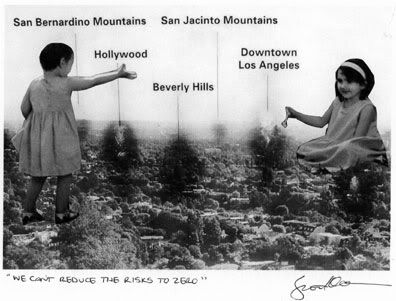"We Can't Reduce the Risks to Zero"

Last night my wife and I watched "Hotel Rawanda." I'm also in the middle of reading "Collapse- How Societies Choose to Fail or Succeed" by Jared Diamond. These twin visions of destruction, inhumanity, and loss and show suffering on a massive scale and are powerful enough to penetrate the leaden barrier of "daily life" and really make us open our eyes. For a few minutes, anyway, until the sheild descends again and the world assumes its more benign face.
It's hardly a new thought, but I am seeing again how much like a virus we are. Our mythic successes- fire, stone tools, iron and copper, gunpowder, cities, electricity, science, all come to seem like accidents of location rather than as particular cultural endowments- that is, the reason one particular society rises to power and maintains it for lengthy periods of time has more to do with the weather, ecological and natural resources available, population pressures, the resiliency of the environment, etc, than with some imgained "cultural" superiority. Imagine a petri dish with areas of rich food and areas of poor food or even poison. Introduce a strain of bacteria and soon the food rich areas will be swarming with thriving bacteria and the barren or poisoned areas will have little or no bacteria. Now if you were to interview the bacteria on the food rich patch, you might hear how much smarter and powerful these bacteria are than the wretched, starving bacteria on the poor areas, and how if those other bacteria knew how to run things they'd have the same benefits and abundance all the "smarter" bacteria enjoy.
Follow the activity in the petri dish a little longer, and you'll soon find the food running out and the dish becoming choked with the waste products of the "successful" bacteria. They are still engaged in the same behavior that spelled success for them in the beginning- eating up the food and reproducing wildly. But now the behavior that brought them initial success is killing them off. Unable to regulate their reproductive rate they plow through their available resources and explode their population base at the same time, while filling the environment with their waste. Soon, everything is gone and the successful bacteria are as dead as doornails. They couldn't get more gone.
A simplistic example that considers only two variables, but illustrative nonetheless.
Ask a Mayan twenty years before the Mayan collapse where things were headed and he or she would have pointed to all the grand temples and cities and said "We are the most powerful beings on the planet. Our destiny is to prosper and control the world."
As I look around at our cities and television and computers and space travel and McDonald's, it seems likely we're in the same boat as everyone else who's sailed over the edge of the world before us. But no one treats this idea with any seriousness. Of course, even if we did there's little reason to believe that would change anything.
So, I turn off the computer and go walk along the cliffs overlooking the Pacific with my lovely wife and our dogs and I hold her hand and breathe in the salt-laden sea air and feel my legs moving, my body living and breathing, and my soul singing with joy, and I give thanks again for this day and every other.
Amen.


9 Comments:
yes, grant me the serenity to accept the things i cannot change.
frogs in the pot.
etceteras. it's all part of the disease. think globally act locally.
ah scott, sometimes it just feels
like the only thing we can do
is live life in joy. even when we're aching.
good collage.
lynze
Hey, Lynze-
I was just wondering to myself if you'd ever come by again, so I'm glad to see your post.
Yeah, living it up while we're all falling down. Pass me
another beer.
Yrs-
Scott
and i can't stop watching it happen, even in my own skin, real as it is, i feel the steady march of a new roman legion- i feel like malcom mcdowell in 'a clockwork orange', eyes propped open and watching, watching
everything. yeah...it's a real horrowshow, but it does help to reach out and commiserate. compare notes on the bad as well as the good.
k.
Karen-
The best thing about the internet is this weird and fragile and goofy feeling of family...
I just wish I could feed y'all...
Scott
"How much like a virus we are." Virulent. Yes. That's a good word for the human species. Who was it that said that man was an escalating beast? Rapacious. There's another word. We'll eat this world alive. We'll eat it out from under us before we're done. We'll have to live on Mars because there'll be nothing left. The planet earth, someday, will be a dump. Literally.
So, I've been walking around with your virus comment in my head. That, and your skull collage below which unnerves me nearly as much as your hyena collage. Are we really that complacent? Has death become art? That's what I think when I look at that image. Walter's pointing at that bone--is it a tibia?--and saying: Margaret, don't you agree that the artful placement of that tibia among all these skulls creates an almost unbearable tension?
Escalating beasts, we.
Meanwhile, all I was really going to say was in response to your response to Karen, which was, as I recall, after all this rambling: Feed us? What would you feed us, Scott? And then, I realized that that was the wrong question--although I am curious to know what you would cook for houseful of poets--or um, the wrong response. Because you already DO feed us, buddy. With your collages, with your poetry, with your life.
Oh, and hey, sis, if you read this--and hey, Scott, sorry to hijack your blog here, but I figure I might catch her here--I'm sorry I had to disable the anonymous comments capacity over yonder on my blog but doing so did stop the spam I was receiving. You know you can create a blog username without having an actual blog. Have you considered doing that?
So, Scott, I'm hungry. What's for dinner?
always grateful to read your words
such a beautiful wisdom you carry
thanx for the think before bed scott
~fx
Laurel-
thanks so much for the great post. I really enjoy watching ideas bang around back and forth between all these great minds.
Finchy-
Yr welcome. Glad you stopped by.
Scott
A good image to walk into the day with: "It's hardly a new thought, but I am seeing again how much like a virus we are." Thanks for your interesting post, Esther
Yes. That was fucking perfect.
Post a Comment
<< Home